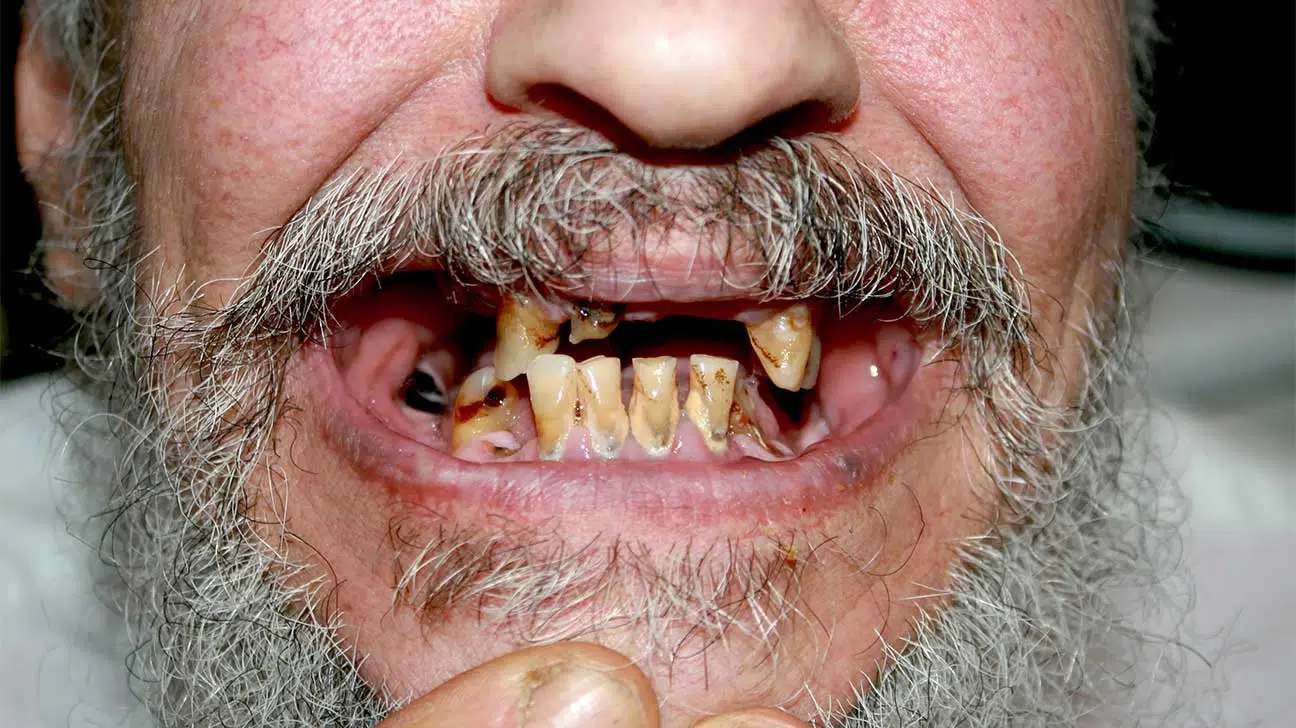Crack Tooth Decay: How Crack Affects Oral Health
Crack cocaine use causes many oral health problems. Its side effects often have a major impact on the mouth and teeth. The best way to prevent these problems is to get addiction help.

Cocaine addiction, including crack cocaine addiction, can harm the body in multiple ways.
This illegal stimulant drug may create a sense of euphoria in the short term, but over time, this kind of drug abuse causes adverse health effects.
Crack cocaine, which is powder cocaine cooked with baking soda, has several side effects that affect the mouth in particular.
Keep reading to learn about this important effect of crack cocaine.
The Effects Of Crack On Dental Health
Because crack cocaine begins as powder cocaine, these two drugs impact oral health in many of the same ways.
Cocaine-related dental issues, or “coke mouth,” are very similar to “meth mouth,” which is another case of tooth decay caused by methamphetamine drug use.
Both cocaine and methamphetamine use cause oral health problems due to their acidity, which damages teeth.
Signs crack is damaging your oral health include:
- gum disease
- cracked teeth
- cavities or fillings
- weakened tooth enamel
- tooth loss
- abscesses
- tooth pain
- jaw pain
Why Does Crack Cocaine Cause Oral Health Damage?
Because crack cocaine contains baking soda, it does not have the same acidity levels as powder cocaine.
Nevertheless, dental experts still notice a connection between all forms of cocaine and poor oral health, including crack cocaine.
Coke Jaw
As a stimulant drug, crack cocaine speeds up the central nervous system. As a result, people who use crack feel a temporary sense of energy and alertness.
However, the stimulant effects of crack also cause side effects, one of which is coke jaw. Coke jaw occurs when cocaine speeds up body movements, causing erratic muscular behaviors.
One of those behaviors is the rapid movement of the jaw. A person who is high on cocaine, including crack cocaine, may move their jaw back and forth uncontrollably.
They may also clench their jaw or grind their teeth, which is a condition known as bruxism. Teeth grinding, when left untreated, can wear down the enamel over time.
Dry Mouth
Like many other stimulants, cocaine causes dry mouth, or a lack of adequate saliva production.
Crack cocaine in particular can worsen this condition even further. Crack is generally consumed via smoking, and the act of smoking also slows saliva production.
The mouth needs saliva to protect the teeth and wash away cavity-causing substances. Without it, the teeth become more vulnerable to cavities and other forms of damage.
Loss Of Oral Hygiene
Drug use in general often causes oral health problems. Crack cocaine use, like other forms of drug addiction, often leads to hygiene issues, including issues with oral hygiene.
As a substance abuse problem becomes more severe, the person dealing with addiction will have less time, energy, and focus to pay attention to their dental health.
Furthermore, drug addiction costs a lot of money over time. Drug use often causes financial difficulty, and dental care requires funds that someone with an addiction may not have.
Apart from routine dental visits, a person with coke mouth may need specific procedures such as root canals, x-rays, tooth extraction, and fillings.
For somebody with a drug addiction, these procedures may be especially unattainable.
Addiction And Eating Disorders
Eating disorders and addiction often coincide, especially when the addiction involves a stimulant drug.
Crack cocaine acts as an appetite suppressant. In fact, the side effects of cocaine include weight loss and malnourishment. Some people begin using cocaine for this very reason.
For a person with a distorted body image, the idea of weight loss may be very appealing, even with the possibility of crack cocaine side effects. Eating disorders, like addictions, may cause specific dentistry concerns.
Bulimia, which is characterized by binging and purging food, causes tooth decay due to acidity from frequent vomiting. Anorexia, which is characterized by extreme food restrictions, weakens the teeth and jaw bone.
The combination of drug use and eating disorders can lead to worsening oral health problems.
Treatment Options For Crack Cocaine Addiction
People with a crack cocaine addiction may require extensive dental care.
However, even after receiving dental treatment, quitting crack is the most important thing a person can do to prevent further damage and keep their mouth healthy.
Fortunately, crack addiction is a treatable disorder. Even after relapse, receiving care for crack addiction can help people regain their health.
Spring Hill Recovery Center offers addiction treatment for people with substance use disorders. We use evidence-based practices to help people regain control over their lives and healthcare.
If you or a loved one need drug addiction support, contact Spring Hill today for more information.
- American Dental Association — Xerostomia (Dry Mouth) https://www.ada.org/resources/research/science-and-research-institute/oral-health-topics/xerostomia
- British Dental Journal — Cocaine And Oral Health https://www.nature.com/articles/sj.bdj.2008.244
- National Institute On Drug Abuse — Cocaine DrugFacts https://nida.nih.gov/publications/drugfacts/cocaine


